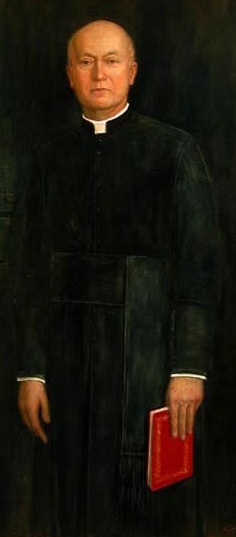
FROM THE PASTOR
by Fr. George W. Rutler
May 17, 2009
by Fr. George W. Rutler
May 17, 2009
The ordination of new priests for our archdiocese last week was accompanied by delightful receptions well suited for the month of May. Graceful conviviality is becoming as rare in our coarsened culture as when the pagan Romans were astonished by the celebratory “refrigeria” of the Christians, free of the vulgarity and cruelty which the post-republican empire had come to equate with fun.
Loss of reverence for innocent life corrupts the manners which were the signature of the classical ages and whose exchange for gaudy excess was the emblem of their decadence. The way people dress and speak and treat one another signals their self-perception. When civility is disdained as bourgeois, the servant is deprived of his royal dignity as a child of God and the king is absolved of his duty to revere those he governs.
Cardinal Newman defined the gentleman, and by inference the lady, in cadences which have become almost as incomprehensible as the terms gentleman and lady themselves. “It is almost a definition of a gentleman to say he is one who never inflicts pain.” He speaks of moral care for the consciences of others. The gentleman puts others at ease and “makes light of favors while he does them, and seems to be receiving when he is conferring.” He does not slander or gossip, treats his enemy as a potential friend and is “merciful to the absurd.”
This is not the low discourse of modern politics and journalism. So annually we now have the perfect storm of barbarism in the White House Correspondents Dinner. Each year it gets worse, and this year a woman, hired as a comedienne, failed in the useful role of court jester, wishing on those “traitors” she did not like sickness and worse. The highest officials of our land joined in the harsh laughter and added sexual innuendoes. Like the Vandals who ridiculed the noble Romans senators, they mocked abstinence from vice and dissected virtue as weakness. The cynicism matched Oscar Wilde saying that a gentleman is one who never inflicts pain unintentionally. Drawing on the fifth century “Psychomachia” of Prudentius, mediaeval writers charted kindness among the “heavenly virtues” to cure envy, which is a motive for cruelty, and pride, which is the alchemy of disdain. Newman knew, like St. Paul, that classical kindness is only aesthetical moral furniture without the love of the Holy Spirit (cf. 2 Cor. 6:6). But he also knew that uncourtly behavior courts blaspheming the Holy Spirit. When journalists approve the rants of poor breeding as “just comedy” and its victims as “fair game,” they approve the sadism of Petronius and the vulgarity of Rabelais. They shift from Mark Twain, who could disagree without being disagreeable, to Fellini who relished degradation. For all his populism, Dickens was a rank snob when he said the term “American gentleman” was a self-contradiction. We should not want to prove him right.
Painting: The Romans of the Decadence, 1847 by Thomas Couture 1815-1879

No comments:
Post a Comment